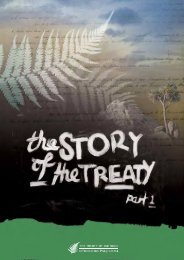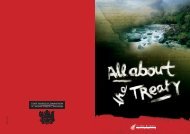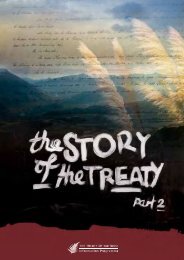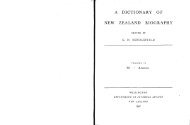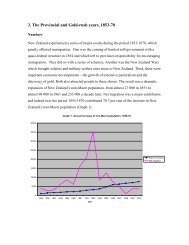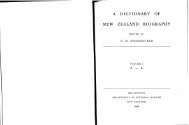Wellington cafe culture 1920-2000 - NZHistory.net.nz
Wellington cafe culture 1920-2000 - NZHistory.net.nz
Wellington cafe culture 1920-2000 - NZHistory.net.nz
You also want an ePaper? Increase the reach of your titles
YUMPU automatically turns print PDFs into web optimized ePapers that Google loves.
The Second World War significantly changed both the music scene and café <strong>culture</strong> in <strong>Wellington</strong>. The big<br />
band sound, developed by American artists such as Glenn Miller, began to dominate. Seven-piece bands<br />
with lead singers such as Dorothy McKegg were a regular feature at the Skyline Restaurant during the<br />
1950s. The wireless and gramophone were becoming commonplace in New Zealand homes and also<br />
allowed café owners to play popular music of the day: 'Most of the coffee-houses have music of some<br />
kind, usually supplied by a pick-up and amplifier, generally a selection of light-classical and popular pieces<br />
with the emphasis on strings and the volume turned low'. This recorded music might include New Zealand<br />
music, such as Maori songs performed by showbands, chorales and concert parties, Hawaiian-influenced<br />
sounds of composers such as Ruru Karaitiana and local versions of country and western. However, jazz<br />
was by far the most popular form of musical entertainment in cafés.<br />
1960–1980<br />
The 1960s saw changes in musical tastes, particularly those of young people, which affected the kinds of<br />
music played in cafés. The popularity of folk music was embraced by <strong>cafe</strong>s such as the Monde Marie in<br />
<strong>Wellington</strong>, which became an important performance venue for local and visiting artists. This trend was<br />
soon to be overtaken by a more pervasive form of popular music.<br />
The Dominion of 22 June 1964 carried the banner headline 'Beatles Arrive'. The visit to <strong>Wellington</strong> of the<br />
four lads from Liverpool signalled the arrival of a new form of musical entertainment. 'In <strong>Wellington</strong>, the<br />
rock'n'roll and pop music scene exploded into action during those halcyon days...there was also a huge<br />
youth club scene in the sixties...And there were the jamborees, the Dancelands, the coffee bars, and the<br />
suburban night clubs too'.<br />
Fans of popular music eagerly sought out the musical offerings of the Searchers, the Tremolos and the<br />
Shadows. Not to be outdone, local artists also cashed in on the bona<strong>nz</strong>a. Stars such as Ray Columbus,<br />
Max Merritt and the Meteors, Howard Morrison, Peter Posa and Lyn Bar<strong>net</strong>t regularly played to full houses<br />
in <strong>Wellington</strong>. The advent of television, with its popular music shows such as 'Happen Inn', was also<br />
influential.<br />
This phenomenon, however, did not have an immediate effect on the café <strong>culture</strong> of <strong>Wellington</strong>. Much of<br />
the entertainment was confined to the dance halls and clubs liberally scattered throughout <strong>Wellington</strong>. The<br />
cafés tended to provide either recordings of popular music or live bands catering for smaller numbers.<br />
The dominance of the dance hall did not last. Changes to the licensing laws meant that pubs and taverns<br />
could stay open longer and the major breweries very quickly took advantage of the opportunity to offer<br />
live entertainment. But the cafés rocked on. Able to provide a wide range of recorded music, they used it<br />
to create and enhance atmosphere.<br />
The 1990s and beyond<br />
The type of musical entertainment offered now often depends on the time of day and the day of the week.<br />
Breakfast is accompanied by electronic music provided by the mandatory stereo system or the occasional<br />
television set pumping out musical video clips or the 'Juice' channel. This theme usually continues through<br />
the lunch period. However, live music is provided at the Ballroom Café no matter whether it is breakfast,<br />
lunch or dinnertime. Bodega has been a vital <strong>Wellington</strong> music venue for over a decade. Axolotl has its<br />
jukebox, Calzone 'during the day has reggae and dub sounds, while at night it shifts into restaurant mode,<br />
with underlying jazz themes'. Diva Bar proclaims proudly, 'There's a jazz base to the music—cruisey by<br />
day and more thumpy by night—Wednesday nights are jazz and cocktail night with a four piece band. On<br />
Thursdays it's a Rhythm and Blues Soul night'. Everything from contemporary jazz, to window-rattling<br />
opera, to serene classical music, to the latest techno funk can be found throughout the city. These<br />
offerings are reflective of both the ambience of the café and the time of day.<br />
Significance - <strong>Wellington</strong> <strong>cafe</strong> <strong>culture</strong><br />
The significance of café <strong>culture</strong> in the formation of <strong>Wellington</strong>'s<br />
identity<br />
by Jason Gaskill



